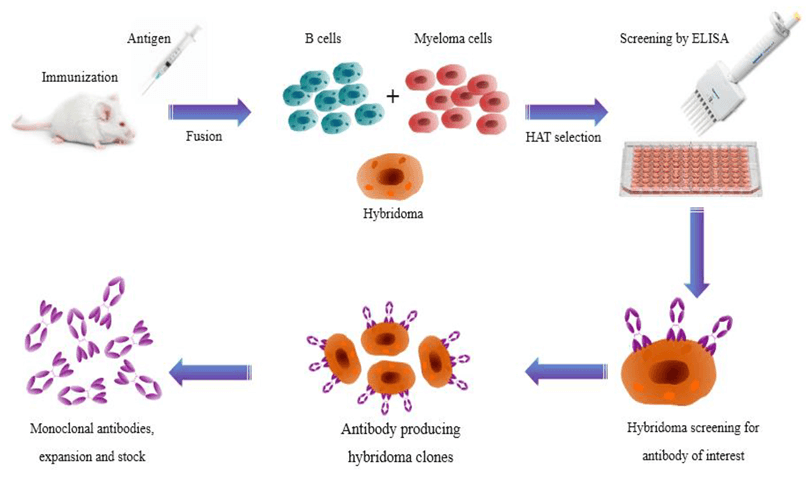Hybridoma Cell Culture Services
Creative Bioarray has many years of experience in culturing hybridoma cells for the production of specific antibodies. With advanced hybridoma platform and screening technique, as well as accumulated experience in cell culture and antibody engineering, we are dedicated to providing high quality and stable hybridomas cell lines to meet your specific requirements of research or manufacturing.
About Hybridoma Technology
Hybridoma technology is a method used to produce large amount of monoclonal antibodies, which can be widely used in biological and medical research, disease prevention, diagnostic and treatment, and clinical applications. Monoclonal antibodies produced by hybridoma technology always retain their native structure. Once stablized, hybridomas can offer unlimited quantities of consistent, homogenized antibodies in a cost-effective manner. This is perfect for further research and application.
Hybridoma technology is mainly based on three key technologies and steps.
- Animal immunity. Before the preparation of hybridoma cells, a target antigen is used to immunize animals, usually mice, to elicit an immune response.
- Cell fusion. B lymphocytes, which have the capability to produce antibodies against the injected antigen, are harvested from immunized animals and then fused with an immortal myeloma cell line. The hybrid cell lines are called hybridomas. They are immortalized cells with the ability to produce unlimited quantities of monoclonal antibodies.
- Hybridoma screening. Firstly, optimal selective media, such as HAT media, are used to remove unfused cells. Secondly, the specific antibody-producing hybridomas of interest need to be identified.
 Figure 1. Illustration showing the production route of hybridoma technology. (Saeed, A. F., et al., 2017)
Figure 1. Illustration showing the production route of hybridoma technology. (Saeed, A. F., et al., 2017)
Our Services
- Various customized specific antigen immunized animals, such as mouse, rat, guinea pig and hamster.
- Basic and large-scale hybridoma cell culture based on our industry leading hybridoma platform.
- Multiple specific antigens used to produce hybridomas capable of producing antibodies that are specific for bacterial, plant, viral and cellular targets, oncogenes, peptides and proteins, and small molecular compounds.
- Comprehensive hybridoma screening to provide you with high-purity hybridoma cells for the preparation of antibodies with high specificity.
- Comprehensive functional testing is available upon your request.
Our Advantages
- Extensive experience in culturing multiple cell types.
- Extensive experience handling various different types of antigens.
- Extensive experience in preparing multiple types of antibodies from various species.
- Professional scientific team, advanced hybridoma platform and high-throughtput screening platform.
- Multiple choices of antigens and animal species.
- High purity, high specificity, high quality.
- Customized solutions for specific requirements.
- Fast turnaround time with competitive price.
Creative Bioarray can produce the most comprehensive list of ready-to-use hybridoma cells. These cells can be used to produce various antibodies covering a wide range of antigens. Comprehensive quality control and authentication procedures are carried out on all cell lines. Cell lines can be supplied either as frozen or growing cultures.
If you are interested in our services or have any specific needs, please feel free to contact us. We look forward to cooperating with you.
Reference:
- Saeed, A. F., et al. Antibody engineering for pursuing a healthier future. Frontiers in microbiology, 2017, 8: 495.
For research use only. Not for any other purpose.

 Figure 1. Illustration showing the production route of hybridoma technology. (Saeed, A. F., et al., 2017)
Figure 1. Illustration showing the production route of hybridoma technology. (Saeed, A. F., et al., 2017)
